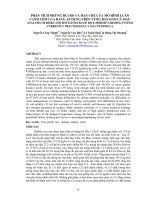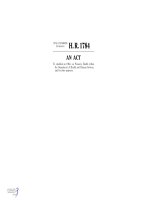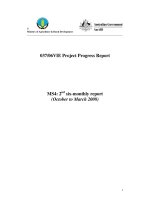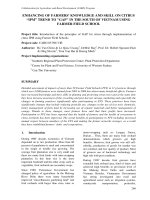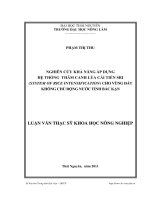Accelerating Women’s Economic Empowerment Through System of Rice Intensification (SRI)
Bạn đang xem bản rút gọn của tài liệu. Xem và tải ngay bản đầy đủ của tài liệu tại đây (293.37 KB, 2 trang )
‘Enhancing
Opportunities for
Women’s Enterprises’
(FLOW/EOWE)
Project
Ministry of Foreign Affairs of the
Netherlands
Accelerating Women’s Economic Empowerment
Through
System of Rice Intensification (SRI)
I. What is SRI?
The System of Rice Intensification (SRI) is an evolving set of practices, principles, and philosophies
aimed at increasing the productivity of irrigated rice by changing the management of plants, soil,
water and nutrients. (IRRI)
SRI Principles
1.
1. Reduce
Reduceseed
seed to
to 33 –– 44 kg
kg //sao
sao (500m
(500m ))
2.
2. Row
Rowsowing
sowing or
or broadcast
broadcast
3.
(AWD)
3. Alternate
AlternateWetting
Wetting and
and Drying
Drying (AWD)
minimise chemicals
4.Use
Usebio-fertilizer,
bio fertilizer, minimise
4.
chemicals
5. Weed and aerate the soil; keep field free from weeds in the first 30 days
2
2
enefits of SRI
II. Benefits of SRI
30% reduced inputs, 15-20% increase in yield and a total income
increase of 20-25%
Reducing field farming workload
Increased crop resilience to climate risks, while reducing GHG
emissions
Minimising chemical and water use and conserving the soil
ecosystem
Cleaner and healthier rice and a potentially higher price
III. Making SRI gender-responsive
Increasing women’s technical knowledge and access to advanced
farming techniques
Promoting women leadership in farmer and business groups and
cooperative boards
Increasing status and participation of women in decision-making
in communities and households
www.snv.org
III.
responsive
IV. Comparison between SRI and conventional method of cultivation
Soil preparation
Well-level the field and divide it into small
beds before seeding. Use furrow drainage
system
No field beds, no furrow or too
shallow furrow
Amount of seeds/sao
(area of 500 m2)
Soil with Good nutrition: 2,5 - 3 kg/sao
Soil with Average nutrition: 3 - 3,5 kg/sao
Soil with Poor nutrition: 4 kg/sao
Large amount of seeds: 7 - 8 kg/
sao
Hand seed broadcasting: Divide seeds
equally for each bed
Drum seeder sowing
Hand seeding, high density
Fertilising
Amount of nitrogenous fertiliser: 4-5 kg/sao
Apply organic fertiliser which enhances soil
structure and functioning
No nitrogenous fertiliser should be applied
when rice blast disease and diseases caused
by micro-organisms occur
Determine the need for nitrogenous fertiliser
application based on leaf color and crop
appearance
Minimise the use of chemical fertilisers during
reproductive period
Amount of nitrogenous fertiliser:
8-10 kg/sao
Less application of organic
manures when preparing soil
Overuse of inorganic synthetic
fertiliser and nitrogenous fertiliser
Continuous application of nitrogen
fertiliser increases disease affection
risks
Water management
Alternate Wetting and Drying (AWD) method:
Non-flooded aerobic soil conditions with
intermittent irrigation
Only need to pump 6-7 times/crop
Continuous flooding of paddy fields
throughout the growing cycle
Need to pump 10 times/crop
Integrated
Pest Management
(IPM) and chemical
using
Apply IPM
Weeds control: Direct control of weeds can
be done through manual weeding by hand
or spraying herbicides which are not harmful
to the environment
Golden apple snails: Furrow facilitate drainage and help snail handpicking easier
No pesticide spraying during 40 days after
sowing
Overuse of pesticides, some types
of pesticides which are extremely
toxic and of unknown origin are still
used
Use chemical to kill golden apple
snails
Collect straws by hand or by using straw
baling machine, no open straw burning
Open straw burning leads to
environmental pollution
7.6 tons/ha
7.4 tons/ha
Method of seeding
Harvest
Yield
Amount of GHG
emissions reduced
4 tons CO2/ha/crop
Project: Enhancing Opportunities for Women's Enterprises (EOWE)
Programme: Funding Leadership Opportunities for Women (FLOW)
Contact information
Ms. Tran Tu Anh
Programme Manager, Climate
Smart Agriculture and Gender
SNV Netherlands Development Organisation
3rd floor, building D, La Thanh hotel
218 Doi Can, Ba Dinh, Hanoi
Tel: +84 4 38463791; Fax: +84 4 38463794




